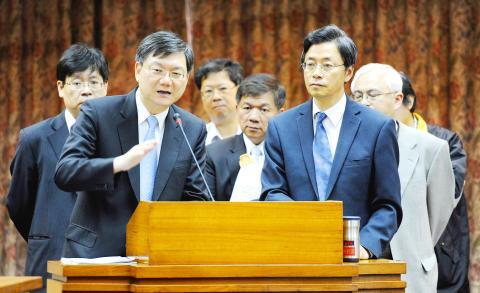Halting the construction of the Fourth Nuclear Power Plant could help Taiwan Power Co (Taipower) avoid bankruptcy, but terminating it permanently would ruin the company, Vice Minister of Economic Affairs Woody Duh (杜紫軍) said yesterday.
Duh made the remarks at a meeting of the legislature’s Education and Culture Committee to discuss the National Science Technology Program-Energy and developing alternative power sources to achieve energy independence and a nuclear-free homeland.
At the meeting, committee members questioned Duh about the possible impact of the Cabinet’s decision yesterday to halt construction on the No. 1 and No. 2 reactors at the plant in New Taipei City’s Gongliao District (貢寮), and seal the first one up after conducting safety inspections.

Photo: George Tsorng, Taipei Times
The vice minister said that while anti-nuclear protesters are concerned that “halting” construction is not the same as “terminating” it, both measures would have the same significant result of putting a stop to building for the moment, but that terminating plant entirely would bankrupt Taipower.
Duh said that project’s NT$283.8 billion (US$92 million) budget would be listed as a company loss if it is “terminated” for good and would therefore force Taipower to declare insolvency according to the Company Act (公司法).
However, if the project is only “halted” so the public can vote on it in the future, that sum would be listed as investment asset, he said.
“Taipower going bankrupt would not benefit anyone,” Duh said, adding that the cost of sealing the No. 1 reactor would be calculated by June.
As for the impact that ceasing construction could have on the supply and cost of electricity, the vice minister said that without a way to compensate for the Fourth Nuclear Power Plant not becoming operational, restrictions on electricity use could be imposed as early as 2021.
“The change in electricity prices would be calculated based on the difference between the cost of nuclear power-generated electricity and that of the amount generated by alternative energy sources to replace the power that was set to be generated by the Gongliao station,” he said.
Duh said electricity prices would increase by approximately 14 percent if the electricity that was to be supplied by the plant is generated by natural gas instead, with the hike set to be as high as 40 percent if the nation’s three operating nuclear power plants are retired.
Also at the meeting, Minister of Science and Technology Simon Chang (張善政) said that although studies have shown that there is sufficient combustible ice in the nation’s southwestern waters to generate electricity, the technology required to make this a viable energy source is not developed enough yet.

DEFENSE: The National Security Bureau promised to expand communication and intelligence cooperation with global partners and enhance its strategic analytical skills China has not only increased military exercises and “gray zone” tactics against Taiwan this year, but also continues to recruit military personnel for espionage, the National Security Bureau (NSB) said yesterday in a report to the Legislative Yuan. The bureau submitted the report ahead of NSB Director-General Tsai Ming-yen’s (蔡明彥) appearance before the Foreign and National Defense Committee today. Last year, the Chinese People’s Liberation Army (PLA) conducted “Joint Sword-2024A and B” military exercises targeting Taiwan and carried out 40 combat readiness patrols, the bureau said. In addition, Chinese military aircraft entered Taiwan’s airspace 3,070 times last year, up about

Taiwan is stepping up plans to create self-sufficient supply chains for combat drones and increase foreign orders from the US to counter China’s numerical superiority, a defense official said on Saturday. Commenting on condition of anonymity, the official said the nation’s armed forces are in agreement with US Admiral Samuel Paparo’s assessment that Taiwan’s military must be prepared to turn the nation’s waters into a “hellscape” for the Chinese People’s Liberation Army (PLA). Paparo, the commander of the US Indo-Pacific Command, reiterated the concept during a Congressional hearing in Washington on Wednesday. He first coined the term in a security conference last

A magnitude 4.3 earthquake struck eastern Taiwan's Hualien County at 8:31am today, according to the Central Weather Administration (CWA). The epicenter of the temblor was located in Hualien County, about 70.3 kilometers south southwest of Hualien County Hall, at a depth of 23.2km, according to the administration. There were no immediate reports of damage resulting from the quake. The earthquake's intensity, which gauges the actual effect of a temblor, was highest in Taitung County, where it measured 3 on Taiwan's 7-tier intensity scale. The quake also measured an intensity of 2 in Hualien and Nantou counties, the CWA said.

The Overseas Community Affairs Council (OCAC) yesterday announced a fundraising campaign to support survivors of the magnitude 7.7 earthquake that struck Myanmar on March 28, with two prayer events scheduled in Taipei and Taichung later this week. “While initial rescue operations have concluded [in Myanmar], many survivors are now facing increasingly difficult living conditions,” OCAC Minister Hsu Chia-ching (徐佳青) told a news conference in Taipei. The fundraising campaign, which runs through May 31, is focused on supporting the reconstruction of damaged overseas compatriot schools, assisting students from Myanmar in Taiwan, and providing essential items, such as drinking water, food and medical supplies,